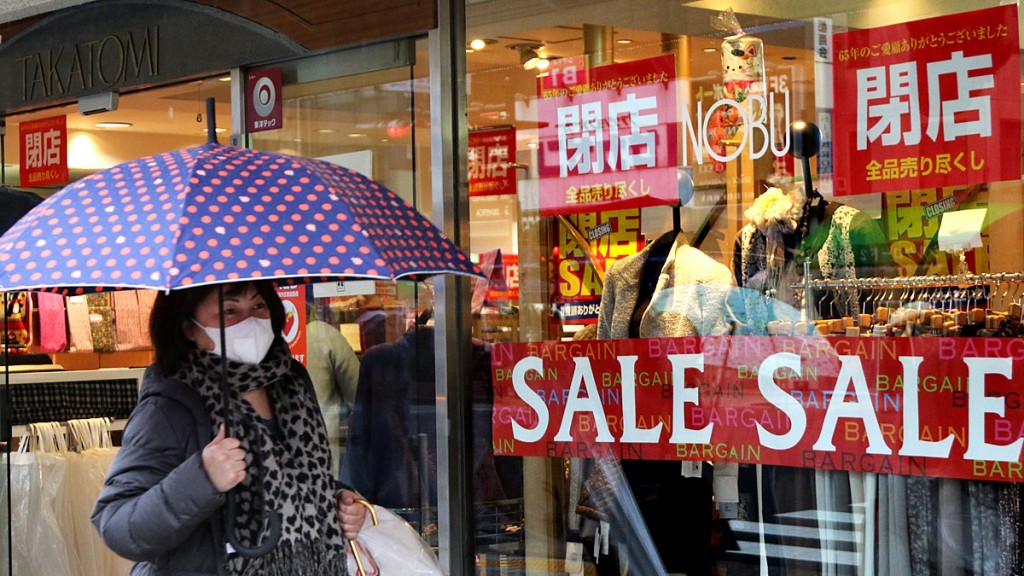
I’ve long been keen on Japan as an investment. And over the last few years, that’s been a pretty decent call.
However, the market hasn’t done well this year, with the Topix – the key Japanese market – has fallen by around 13% year-to-date (in yen terms, at least).
So a recent analysts’ note – suggesting that 2017 will be a good year for Japan and that now is the time to buy – caught my eye…
Japan: the land of ever-decreasing prices
Japan is still beset by deflation. The Bank of Japan (BoJ) had hoped that consumer price index inflation would be rising at an annual rate of around 2% by now, or at least showing signs of getting there.
Instead, if you leave out the price of volatile goods such as food and fuel, then “core” inflation is negative. In other words, prices are falling.
Now, we can have a long debate on the rights and wrongs of deflation, and we can ponder why anyone would complain about stuff being cheaper this month than it was last month.
But the bottom line is that central banks believe that you need at least a little bit of inflation to keep the economy ticking over, so that’s what they aim for.
One of the key aims of Prime Minister Shinzo Abe’s “Abenomics” scheme was to weaken the Japanese yen, and thus boost inflation and exports. And it did the trick to an extent. Back in 2012, the Japanese yen was at less than 80 to the dollar. Now it’s around 100, and has been as much as 125 in recent years.
The trouble is that the currency war approach doesn’t seem to be working anymore. The US dollar isn’t on a one-way trip higher these days, and nor is any other currency.
And despite persistent market expectations that BoJ governor Haruhiko Kuroda would feel obliged to “do something” about this, he’s not really been very active this year. That might be because his confidence has been rattled after his decision to cut interest rates into negative territory earlier this year unnerved rather than reassured markets.
So why does Bank of America Merrill Lynch (BoAML ) think that a big buying opportunity for Japan lies ahead?
The bull case for Japan
The bull case hinges on a few factors. Firstly, BoAML reckons the oil price will stabilise and recover going into 2017. A stronger oil price would mean higher inflation in general. It would also mean Japan’s import bill would go up. That’s a negative for the currency. Also, traders are heavily long the Japanese yen right now. From a contrarian point of view that’s often a sign that you should go the other way.
But it’s not just about stronger oil prices – there’s no guarantee of those, after all. Japan’s economy generally is seeing more inflationary pressure building.
As Marcel Thieliant of Capital Economics points out, the Japanese unemployment rate is at its lowest level since the mid-1990s. The job-to-applicant ratio suggests it is set to fall even further soon.
The resulting shortage of potential employees should really put some pressure on wages to rise, which ultimately is the sort of inflation that Japan wants. The good news is that we’re starting to see that come through, notes Theiliant: “The latest data show a long-awaited pick-up in wages too.”
Also, the more the yen gains against the dollar, the more pressure there is on the Bank of Japan to do something radical. If Kuroda is unable to get the rest of his staff on side, we could see the government push through even looser fiscal policy.
The next big date to watch out for is 21 September. That’s when the BoJ carries out a “comprehensive assessment” of its policies. Japanese government bonds have already been slipping lower (in other words, yields have been rising) as markets expect to see some sort of action, potentially a retreat from quantitative easing (QE).
An end to QE might not sound bullish. However, as BoAML points out, it could actually help. “A mildly steeper yield curve” – in other words, a pickup in longer-term interest rates – “may benefit bank shares”.
You see, banks make their money by “borrowing short and lending long”. So if the gap between short-term interest rates and long-term ones is narrow – as it is now – that’s not great for bank profits.
Historically speaking, it’s hard for a genuine recovery to get going without a rally in the banking sector. So a recovery in the banks could, in turn, “support the broader market”, notes BoAML.
I already hold Japan in my portfolio and I’m sticking with it. I’d suggest you do too. We’ll be talking more about the country’s prospects in an issue of MoneyWeek magazine later this quarter – sign up for a subscription now if you haven’t already done so.